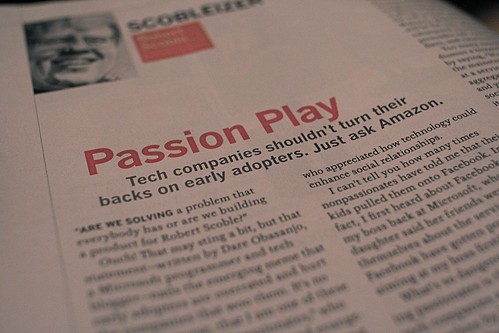Your early adopters are a startups dream. They use your service, tell all their friends, they report bugs, they love you, they really do.
And you should know that at a point, you need to ignore them.
I read about this topic in Robert Scoble’s Fast Company article this month, Passion Play. What he says is exactly what I thought before working in startups, a good read.
Friendfeed is having a hard time. It is listening to early adopters, building a product for them. Pretty cool for the select few, but in doing that, they have driven away quite a few people that would have used it, myself included.
I identify myself as a horrid early adopter because I find every bug your product has. I tried friendfeed and thought it was neat, but not for me. This happens often for me. My next step is to listen to my friends to see if they are using it or getting benifit from the service. Most services do, and I end up getting back into it. Twitter was an example.
What do people have to say about the use of FriendFeed? “Echo chamber.” “Is anyone that isn’t big actually using this?” “A total waste of my time.”
Very few of my friends have found utility in it. The only thing I find interesting about it is it does a much better job of indexing my twitter stream in search results. No amount of likes, side conversations or random flickr pictures I find from it will make it better, this product is built for those in the web that are power users, and that makes a product that is hard to use casually.
The kindle is selling just fine, even though Robert hated it. Everyone that I know that has one loves it, and tells their friends frequently.
The early adopters that they built the service for, the ones who left MySpace for FaceBook for Twitter for Pownce for Jaiku are leaving them, chasing the next shiny object (which isn’t a negative thing at all).
FriendFeed’s numbers are flattening out.
And more people are trying to get me to join plurk, which just horrifies me.

Leave a Reply
You must be logged in to post a comment.